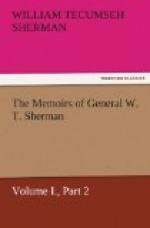At Iuka I issued all the orders to McPherson and Hurlbut necessary for the Department of the Tennessee during my absence, and, further, ordered the collection of a force out of the Sixteenth Corps, of about eight thousand men, to be commanded by General G. M. Dodge, with orders to follow as far east as Athens, Tennessee, there to await instructions. We instantly discontinued all attempts to repair the Charleston Railroad; and the remaining three divisions of the Fifteenth Corps marched to Eastport, crossed the Tennessee River by the aid of the gunboats, a ferry-boat, and a couple of transports which had come up, and hurried eastward.
In person I crossed on the 1st of November, and rode forward to Florence, where I overtook Ewing’s division. The other divisions followed rapidly. On the road to Florence I was accompanied by my staff, some clerks, and mounted orderlies. Major Ezra Taylor was chief of artillery, and one of his sons was a clerk at head-quarters. The latter seems to have dropped out of the column, and gone to a farm house near the road. There was no organized force of the rebel army north of the Tennessee River, but the country was full of guerrillas. A party of these pounced down on the farm, caught young Taylor and another of the clerks, and after reaching Florence, Major Taylor heard of the capture of his son, and learned that when last seen he was stripped of his hat and coat, was tied to the tail-board of a wagon, and driven rapidly to the north of the road we had traveled. The major appealed to me to do something for his rescue. I had no cavalry to send in pursuit, but knowing that there was always an understanding between these guerrillas and their friends who staid at home, I sent for three or four of the principal men of Florence (among them a Mr. Foster, who had once been a Senator in Congress), explained to them the capture of young Taylor and his comrade, and demanded their immediate restoration. They, of course, remonstrated, denied all knowledge of the acts of these guerrillas, and claimed to be peaceful citizens of Alabama, residing at home. I insisted that these guerrillas were their own sons and neighbors; that they knew their haunts, and could reach them if they wanted, and they could effect the restoration to us of these men; and I said, moreover, they must do it within twenty-four hours, or I would take them, strip them of their hats and coats, and tie them to the tail-boards of our wagons till they were produced. They sent off messengers at once, and young Taylor and his comrade were brought back the next day.




